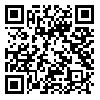Volume 15, Issue 5 (Dec 2021 & Jan 2022)
payavard 2022, 15(5): 468-478 |
Back to browse issues page
Ethics code: IR.TUMS.SPH.REC.1399.157
Download citation:
BibTeX | RIS | EndNote | Medlars | ProCite | Reference Manager | RefWorks
Send citation to:



BibTeX | RIS | EndNote | Medlars | ProCite | Reference Manager | RefWorks
Send citation to:
Goharinejad S, Rostam Niakan Kalhori S, Salari R, Ebrahimi M. Design and Validation of an Assessment Tool to Determine the Level of Self-Care of Patients Affected by Diabetes Type II. payavard 2022; 15 (5) :468-478
URL: http://payavard.tums.ac.ir/article-1-7099-en.html
URL: http://payavard.tums.ac.ir/article-1-7099-en.html
1- Master of Science in Health Information Technology, School of Allied Medical Sciences, Tehran University of Medical Sciences, Tehran
2- Associate Professor, Department of Health Information Management, School of Allied Medical Sciences, Tehran University of Medical Sciences, Tehran, Iran; Research Fellow at Peter L. Reichertz Institute for Medical Informatics (PLRI), Technical University of Braunschweig and Hannover Medical School, Braunschweig, Germany ,sharareh.niakankalhori@plri.de
3- Ph.D. in Medical Informatics, Poostchi Ophthalmology Research Center, Department of Ophthalmology, School of Medicine, Shiraz University of Medical Sciences, Shiraz, Iran
4- Medical Specialist in Endocrinology and Metabolism, Associate Professor, Department of Internal Medicine, Sina Hospital, Tehran University of Medical Sciences, Tehran, Iran
2- Associate Professor, Department of Health Information Management, School of Allied Medical Sciences, Tehran University of Medical Sciences, Tehran, Iran; Research Fellow at Peter L. Reichertz Institute for Medical Informatics (PLRI), Technical University of Braunschweig and Hannover Medical School, Braunschweig, Germany ,
3- Ph.D. in Medical Informatics, Poostchi Ophthalmology Research Center, Department of Ophthalmology, School of Medicine, Shiraz University of Medical Sciences, Shiraz, Iran
4- Medical Specialist in Endocrinology and Metabolism, Associate Professor, Department of Internal Medicine, Sina Hospital, Tehran University of Medical Sciences, Tehran, Iran
Abstract: (1754 Views)
Background and Aim: Diabetes Type II is a chronic metabolic disorder rising its prevalence worldwide. Self-care is the most important management strategy to control the disorder and its adverse effects. The aim of this study was to design and validate an assessment tool to determine the level of self-care of patients affected by Diabetes type II.
Materials and Methods: This study was a cross-sectional study. To conduct this study, based on reviewing the texts and reviewing the existing questionnaires, the proposed items were prepared and by eliminating and integrating similar items into a questionnaire in 4 areas related to diet, blood sugar monitoring, Physical activity, drug use was designed with 15 questions. Thirty patients with type 2 diabetes referred to the endocrinology clinic completed a questionnaire. The reliability of the questionnaire was assessed using Cronbach’s alpha and the validity of the questionnaire was assessed by content validity (CVR). Data were analyzed using SPSS software.
Results: The results showed that the mean and standard deviation of the age of the studied units was 52.4±12.51 years, of which 50% were female and the other 50% were male. 56% of them had type 2 diabetes for less than 5 years. Also, people with higher education had relatively better metabolic control in diabetes management and patients ‘answer to question 6 had the highest mean, which shows patients’ attention to blood sugar control. To determine the reliability of the questionnaire, Cronbach’s alpha coefficient for all questions was 0.773, with the omission of question 9, it was increased to 0.796. Only two validity questions were 0.66 and 0.16 which were excluded from the test. Pearson correlation coefficient was calculated for each question.
Conclusion: The results of this study showed that the questionnaire has the necessary validity and reliability. With this tool, appropriate advice can be provided to patients with type 2 diabetes in the field of self-care, including diet, medication, physical activity and blood sugar control to prevent the progression of the disease and its complications.
Materials and Methods: This study was a cross-sectional study. To conduct this study, based on reviewing the texts and reviewing the existing questionnaires, the proposed items were prepared and by eliminating and integrating similar items into a questionnaire in 4 areas related to diet, blood sugar monitoring, Physical activity, drug use was designed with 15 questions. Thirty patients with type 2 diabetes referred to the endocrinology clinic completed a questionnaire. The reliability of the questionnaire was assessed using Cronbach’s alpha and the validity of the questionnaire was assessed by content validity (CVR). Data were analyzed using SPSS software.
Results: The results showed that the mean and standard deviation of the age of the studied units was 52.4±12.51 years, of which 50% were female and the other 50% were male. 56% of them had type 2 diabetes for less than 5 years. Also, people with higher education had relatively better metabolic control in diabetes management and patients ‘answer to question 6 had the highest mean, which shows patients’ attention to blood sugar control. To determine the reliability of the questionnaire, Cronbach’s alpha coefficient for all questions was 0.773, with the omission of question 9, it was increased to 0.796. Only two validity questions were 0.66 and 0.16 which were excluded from the test. Pearson correlation coefficient was calculated for each question.
Conclusion: The results of this study showed that the questionnaire has the necessary validity and reliability. With this tool, appropriate advice can be provided to patients with type 2 diabetes in the field of self-care, including diet, medication, physical activity and blood sugar control to prevent the progression of the disease and its complications.
Send email to the article author
| Rights and permissions | |
 |
This work is licensed under a Creative Commons Attribution-NonCommercial 4.0 International License. |





